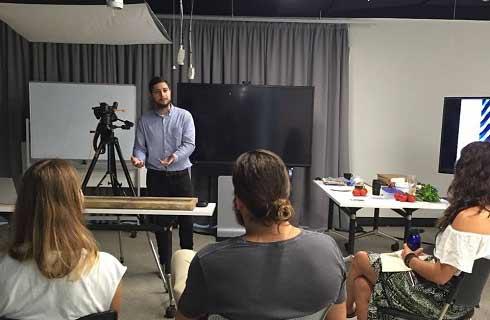工程荣誉学士/法学学士
Bachelor of Engineering Honours/Bachelor of Laws

学历文凭
Dual Degree

专业院系
Business and Law

开学时间

课程时长

课程学费

国际学生入学条件
IDP—雅思考试联合主办方

雅思考试总分
6.0
- 雅思总分:6
- 托福网考总分:70
- 托福笔试总分:550
- 其他语言考试:Pearson English Test (PTE)Academic- 52 with no scores less than 50.
CRICOS代码: 083194J
申请截止日期: 请与IDP联系 以获取详细信息。
课程简介
This double degree combines a full engineering degree with a full law degree program that satisfies the academic requirements for the admission of law graduates as legal practitioners in Western Australia. The result of this challenging educational initiative is an internationally recognised double degree that will create opportunities in the global marketplace. It provides students with lifelong transferable skills, equipping them for employment in a wide range of professions, and for further study in a variety of disciplines.Course learning outcomesDemonstrate advanced knowledge of law and the underpinning natural and physical sciences and in depth understanding of specialist bodies of knowledge within the engineering and law disciplines.Think critically, and apply established methods and research skills to the solution of complex engineering and legal problems.Apply systematic planning, synthesis and design processes to conduct and manage engineering or legal projects, with some intellectual independence.Demonstrate conceptual understanding of the mathematics, numerical analysis, statistics and computer and information sciences which underpin engineering and law disciplines and fluently apply engineering skills, techniques, tools and resources, as well as the skills associated with legal research and scholarship.Demonstrate clear and coherent oral and written communication in professional and lay domains.Demonstrate a global outlook and knowledge of contextual factors impacting engineering and law disciplines, including respect for cultural diversity and indigenous cultural competence.Demonstrate effective team membership and team leadership to implement engineering or legal projects according to relevant standards of ethical conduct, sustainable practice and professional accountability.
相关申请
 预科
预科 奖学金
奖学金 实习机会
实习机会 在校学习
在校学习 跨境学习
跨境学习 校园授课-线上开始
校园授课-线上开始 在线/远程学习
在线/远程学习
开学时间&学费
学费信息仅供参考,请与IDP联系以获取详细信息
| 开学时间 | 时长 | 学费 | 地点 |
|---|---|---|---|
| 暂无 | 暂无 | 暂无 | 暂无 |
学校排名

世界排名501
数据源:
泰晤士高等教育世界大学排名
关于伊迪斯科文大学

埃迪斯科文大学(ECU)创建于1991年,是澳大利亚一所现代化的院校,因开设具有超前思维的先进课程而闻名,致力于帮助其学生为满足未来社会的需求做好充分准备。在''2024年优秀大学指南''(Good Universities Guide)中,该校的教学质量被评为五星级。该校已连续17年获得此成绩。埃迪斯科文大学位于西澳大利亚州首府珀斯,因规模庞大的古岩层景观、世界一流的酒庄和数千英里有着温暖清澈海水的沙滩而闻名。这是一座充满活力的城市,经济发展迅速,有大量旅游胜地和活动供学生去探索。埃迪斯科文大学开设有250多门课程。该校与专业合作伙伴共同开发了这些课程,确保课程内容始终与行业需求相关。许多课程包含职业模块、实习和小组项目,培养学生优秀的批判思考能力,使该校毕业生受到未来雇主的青睐。埃迪斯科文大学还因提供必要的支持服务而闻名,旨在确保其3.1万名学生的学术能力和个人能力得到全面发展。该校提供奖学金和助学金,还有一个积极活跃的学生会。学生会经常举办社交活动,并成立了很多俱乐部和社团,学生可以自由选择参加。该校营造了一个热情的学生社区,拥有由来自100多个国家的约6000名国际学生组成的充满活力的多样化学生群体,国际学生满意度指标得分很高。
本校相关课程

理学学士(物理学)荣誉
学历文凭
Bachelor Degree with Honours
开学日期
课程费用总额


文学士(艺术管理)
学历文凭
Bachelor Degree
开学日期
课程费用总额


教育领导力研究生证书
学历文凭
Graduate Certificate
开学日期
课程费用总额


公共卫生研究生文凭
学历文凭
Graduate Diploma
开学日期
课程费用总额


工程科学学士
学历文凭
Bachelor Degree
开学日期
课程费用总额


语言病理学学士
学历文凭
Bachelor Degree
开学日期
课程费用总额

其他相关课程

LLB (Hons) Common Law/Philosophy
 格拉斯哥大学
格拉斯哥大学泰晤士高等教育世界大学排名:84
学历文凭
Bachelor Degree with Honours
开学日期
课程费用总额


International Foundation Year (Law)
 兰卡斯特大学
兰卡斯特大学泰晤士高等教育世界大学排名:185
学历文凭
Foundation for Undergraduate
开学日期
课程费用总额


LLM International Trade and Maritime Law
 埃塞克斯大学
埃塞克斯大学泰晤士高等教育世界大学排名:339
学历文凭
Masters Degree (Taught)
开学日期
课程费用总额


LLM Law
 桑德兰大学
桑德兰大学学历文凭
Masters Degree (Taught)
开学日期
课程费用总额


理学学士和法学学士-化学
 悉尼大学
悉尼大学泰晤士高等教育世界大学排名:54
学历文凭
Dual Degree
开学日期
课程费用总额


Bachelor of Laws / Bachelor of Psychology
 伊迪斯科文大学
伊迪斯科文大学学历文凭
Dual Degree
开学日期
课程费用总额










